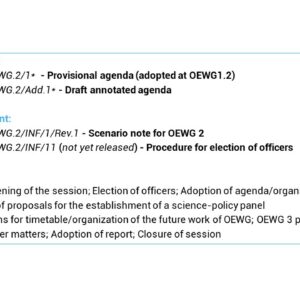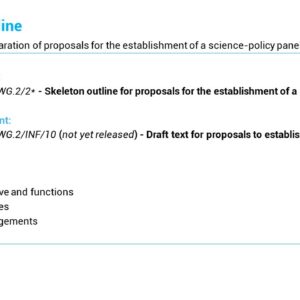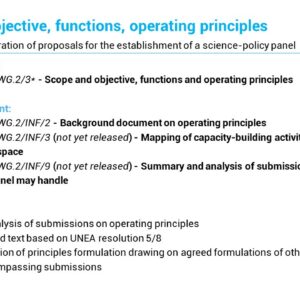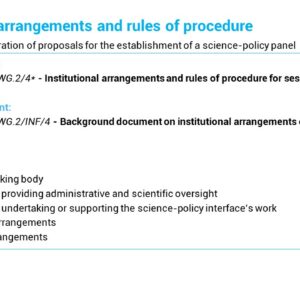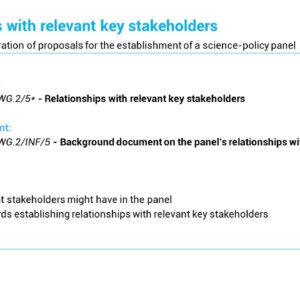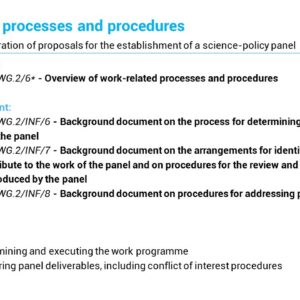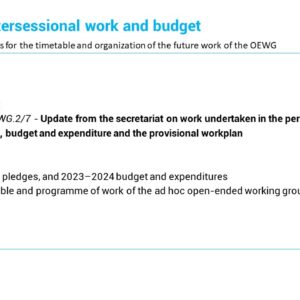Événement Conférence
Briefing on the 2nd Session of the Ad Hoc Open-Ended Working Group on the Science-Policy Panel to Contribute Further to the Sound Management of Chemicals and Waste and to Prevent Pollution | Road to OEWG2 Series

28 Nov 2023
13:00
Lieu: Online | Webex
Organisation: Groupe de travail spécial à composition non limitée chargé d’examiner la création d’un groupe d’experts sur l’interface science-politiques au service de la gestion rationnelle des produits chimiques et des déchets et de la prévention de la pollution, Geneva Environment Network
This briefing on the second session of the Ad Hoc Open-Ended Working Group on the Science-Policy Panel to contribute further to the sound management of chemicals and waste and to prevent pollution (OEWG 2) taking place in Nairobi, from 11 to 15 December 2023, and preceding informal consultations on 9 and 10 December was held within the framework of the Geneva Environment Network, and concluded a series of events organized in preparations for OEWG 2.
About this Event
At the 5th session of the UN Environment Assembly (UNEA 5), countries agreed to establish an independent, intergovernmental science-policy panel to contribute further to the sound management of chemicals and waste and to prevent pollution. An ad hoc open-ended working group (OEWG) process has been initiated to prepare proposals for the panel. As set out in the UNEA 5 resolution, the panel will support countries to take action on chemicals, waste, and pollution prevention, including implementing various international instruments such as multilateral environmental agreements (MEAs), by providing policy-relevant scientific advice. The Panel will also further support relevant MEAs, other international instruments and intergovernmental bodies, and other relevant stakeholders in their work.
The OEWG concluded its first session on 30 January to 3 February 2023 in Bangkok, Thailand, with a particular focus on the scope and functions of the panel and intersessional work, and agreed to hold its second session in December 2023.
This briefing will provide updates on the preparations for the second session of the Ad Hoc Open-Ended Working Group on a Science-Policy Panel to contribute further to the sound management of chemicals and waste and to prevent pollution (OEWG 2) taking place in Nairobi, from 11 to 15 December 2023, and preceding informal consultations on 9 and 10 December. It consisted of two major parts: 1) a briefing from the Chair of the OEWG process on the approach to work towards proposals for the panel using a ‘skeleton outline’ at OEWG 2 and the overall expected outcomes; and 2) a general briefing on the overall preparations for OEWG 2 by the secretariat. This briefing, held within the framework of the Geneva Environment Network, concluded the series of the “Road to OEWG 2” events organized in preparation for OEWG 2.
Road to OEWG 2 Series
In preparation for the second session, the Road to OEWG 2 | Science-Policy Panel to Contribute Further to the Sound Management of Chemicals and Waste and to Prevent Pollution webinar and event series, co-organized by the OEWG Secretariat and Geneva Environment Network aims to build bridges between and among stakeholders, and promote collaboration and knowledge sharing in preparation for OEWG 2 in December 2023.
Previous webinars and events in the series have focused on the process for establishing a science-policy panel, its scope and possible structure (24 January 2023); lessons learned the Intergovernmental Panel on Climate Change (IPCC), Intergovernmental Science-Policy Platform on Biodiversity and Ecosystem Services (IPBES), International Resource Panel (IRP), Montreal Protocol, and World Health Organization (WHO) (5 October 2022); the scope of the panel (25 July 2022), operating principles of existing science-policy interfaces mentioned above, (26 April 2023); building bridges between and among stakeholders and raising awareness about the OEWG process (2 May 2023 as a side event to the 2023 BRS COPs); and how members of the Society of Environmental Toxicology and Chemistry (SETAC) can contribute their scientific expertise throughout the process (1 May 2023, during the European Special Session of SETAC Annual Meeting).
Speakers

Gudi ALKEMADE
Chair, OEWG on a Science-Policy Panel on Chemicals, Waste and Prevention of Pollution | Deputy Permanent Representative to UNEP, Kingdom of the Netherlands

Michel TSCHIRREN
Head, Global Affairs Section, Federal Office for the Environment, Switzerland

Tessa GOVERSE
Principal Officer, Secretariat of the OEWG on a Science-Policy Panel on Chemicals, Waste and Prevention of Pollution, UNEP

Jacqueline ALVAREZ
Chief, Chemicals and Health Branch, UNEP

Nalini SHARMA
Programme Officer, Secretariat of the OEWG on a Science-Policy Panel on Chemicals, Waste and Prevention of Pollution, UNEP

Pia KOHLER
Secretariat of the OEWG on a Science-Policy Panel on Chemicals, Waste and Prevention of Pollution, UNEP

Zhanyun WANG
Secretariat of the OEWG on a Science-Policy Panel on Chemicals, Waste and Prevention of Pollution, UNEP

Nasrudin ABDIRASHID
Conference Services, Governance Affairs Office, UNEP
Highlights
Summary
Part I: Briefing from the Chair on the OEWG process
Presentation on the proposed way of working at OEWG 2 and expected outcomes, including the role of the skeleton outline for preparing proposals for the science-policy panel — Gudi ALKEMADE | Chair, OEWG on a Science-Policy Panel on Chemicals, Waste and Prevention of Pollution | Deputy Permanent Representative to UNEP, Kingdom of the Netherlands
This webinar which is the last webinar of the series to prepare the road to the open-ended working group’s second session. Let me express appreciation for the role that this series of webinars has played in raising awareness and for member states and stakeholders to the work of this important process. The first part of this webinar to presents the approach to prepare our proposals for the science-policy panel which will shape both our upcoming meeting as well as the third session of the OEWG.
To provide further background on the skeleton outline for proposals for establishing the science-policy panel, as well as to zoom in on the recommendations coming out of the process to provide recommendations to the intergovernmental meeting that is mandated to the Executive Director to establish the panel.
To provide further background on the skeleton outline as well as to provide some thoughts of how we, in our consultations, in the bureau thought this could help our negotiations on track with the ambitious timeline that is set out in UNEA resolution 5/8 to deliver our proposals by the end of 2024. We will also have an opportunity to exchange on this at the informal consultations scheduled for Saturday, 9 December.
Proposed skeleton outline. This is presented in the pre-session documents (UNEP/SPP-CWP/OEWG.2/2). This was based on the exchange that we had in the first session of the open-ended working group on the intersectional work, as well as in the discussions that we had in the bureau with the Secretariat in making the preparations for identifying all the documents that should inform the member states in developing the proposals, in line with the mandates set out in paragraphs 5 and 6 of the resolution.
Following further discussion in the bureau, we saw the skeleton outline could serve two general objectives. First, to ensure that all necessary proposals are developed and finalized for the intergovernmental meeting to establish the science-policy panel. Second, to make headway in providing guidance on the rules, working processes, and other procedures that the panel will need to start its work and deliver on its promise as quickly as possible. These two separate goals are generally reflected in the structure of the skeleton outline.
Parts A, B, and C in the skeleton outline constitute what I would call the basis for the foundational document outlining the key features of the panel.
- A. Scope and functions of the Panel – Capturing Annex II of UNEP/SPP-CWP/OEWG.1/7
- B. Operating principles of the Panel
- C. Institutional arrangements of the Panel
- Annex 1. Rules of procedure
- Annex 2. Financial rules and procedures
- Annex 3. Relationships with relevant key stakeholders
- Annex 4. Process for determining and executing the work programme, including the prioritization criteria
- Annex 5. Procedures for the review and adoption of reports
- Annex 6. Arrangements for identifying and engaging with experts
- Annex 7. Conflict of interest policy
These will include the text proposals necessary to establish the panel, including the scope and functions of the panel — which would capture the discussions that we already had in the resumed first session — the operating principles of the panel, and the institutional arrangements including on the decision-making bodies and other bodies such as administrative, scientific, and other possible bodies of the panel. It would set out the arrangements for the secretariat as well as financial arrangements.
The second series of items would contain the rules, processes, policies or other documents that the open-ended working group could prepare or develop guidance on how they could be prepared, so that the panel can adopt them as soon as possible after its establishment so that it can start its work as soon as possible. The goal is to ensure that the panel is equipped with the relevant guidance to start delivering on the functions that was meant to be developed by the OEWG. There may be other elements that the OEWG may wish to pick up and provide guidance on based on the information and working documents.
We had discussed in the bureau meeting that it might be useful for the OEWG to develop an information document with text emanated from the working and information documents to be used possibly by the contact group as basis for their discussions.
Outcome of the OEWG process. After its third session, it is expected that the OEWG would provide a recommendation to the Intergovernmental Meeting for a draft decision to be adopted at that meeting on the establishment of a science policy panel. That draft decision recommended for adoption could contain different elements:
- Preambular paragraphs, including reference to the outcome document of the OEWG
- Decision to establish an SPP [name] as set out in the first part of the skeleton outline agreed by the OEWG
- Forward and recommend for consideration of the panel [at its first meeting] the documents set out in the annexes of the skeleton outline agreed by the OEWG (which could be either fully flat developed documents or those providing guidance to the panel when they are developing their proposals).
I thought it would be good to give a heads up for this for this part of the work that we need to deliver so that we have a clear recommendation to the intergovernmental meeting on what it is that they need to adopt, while at the same time highlighting that most likely it is more efficient for us to focus on the outcomes of the OEWG in describing the features of the panel while already indicating that this is something to be considered. We may also want to consider tasking the bureau and/or the Secretariat to develop a first draft based on the outcomes of the second session to be prepared towards the third session.
Contact groups. We have discussed in the bureau to propose to establish four contact groups four contact groups that brings together the different elements of the text that need to be developed by the by the OEWG:
- Scope, functions, operating principles and conflict of interest, picking up from previous session
- Institutional arrangements and relationships with key stakeholders, taking into account the different roles (background document provides basis for consideration)
- Work-related processes and procedures of the panel: determining the work programme; identifying and engaging experts; review and adoption of reports and assessments, scheduled a bit later in the week
- Intersessional work and budget in advance of OEWG 3 and beyond, where the suggestion for the work will emanate from the other contact groups.
What is expected as an outcome.
- Elected its remaining officers and established its full Bureau
- Agreed on the skeleton outline for the proposals for the establishment of a science-policy panel, towards a basis to have a common understanding of what it is that the working group needs to deliver
- Finalized considerations on the objective and the principal functions of the panel
- Agreed on the proposal for the operating principles of the panel
- Agreed on institutional arrangements and the table of content for the rules of procedure
- Agreed on the modalities for relevant key stakeholders to participate in the panel’s work
- Considered work-related processes and procedures of the panel
- Agreed on the provisional agenda of the third session
- Confirmed any intersessional work to be carried out
There is a lot of work to be done. Hopefully, the working group can be assisted in thinking of how to develop the proposals to establish the panel based on the document (Draft text for proposals to establish a science-policy panel, OEWG.2/INF/10) that was tasked to the Secretariat. The advanced version of the scenario note (OEWG.2/INF/1) has also been uploaded.
Discussion
Q: Has it been already decided when the intergovernmental meeting that will adopt the draft proposals that are being prepared by the OEWG will take place?
Gudi ALKEMADE | There has not been a decision on when and where the intergovernmental meeting is to be held. My understanding is that this is mandated to the Executive Director. I can also imagine that you might want to have a better understanding of the progress made in our next meeting. I would assume that after the meeting, there’s also more clarity.
Q: We also appreciate the extension of the deadline for written submissions to 30 November, but on what basis can these written submissions be done as there is no template?
Tessa GOVERSE | On the invitation to provide written submissions on the documentation, indeed there’s no specific template provided. It’s an open solicitation of views and perspectives on the documentation that is on the table for the second session. The deadline to do so is until 30 November, and these will be uploaded on the website to take note or consult as the Secretariat will not provide further documentation consolidating these views.
Gudi ALKEMADE | From my perspective as chair, this was a follow up on a request, including by stakeholders, on how they could make their views heard. We saw this as a way for member states and stakeholders to provide their views with other participants, the bureau or the Secretariat in advance of the meeting. This would also inform the discussions held during the meeting.
Q: What can we expect from and when can we expect the draft text proposals?
It is already available in the form of OEWG.2/INF/10. This will provide some possible text proposals that could be considered as a starting point for the negotiations.
Q: Oscar GONZALEZ, from the Spanish presidency of the Council of the European Union | With regards to conflict of interest, what do you think would be the program for this? It is in the contact groups, but may not have been in the outcomes.
Gudi ALKEMADE | On what type of guidance the working group may wish to provide on conflict of interest is up to the OEWG. But to return to the discussions held during the first session of the first resumed session of the open-ended working group, my understanding was that the issue came up in the context of discussing the scope of the panel. It was also raised in relationship to operating principles of of the panel so that was also a reason to put this in the cluster of contact group one that looks at both of them. The proposal would be to schedule a discussion on conflict of interest relatively early in the contact groups with a view to understand for member states and stakeholders to understand whether this is an issue that needs to be referred back to in the context of the scope or addressed under either or both the operating principles as well as the working related procedures or policies, whether this is sufficiently addressed in in any of those items.
What I assume is that the discussion will focus on what is considered to be a conflict of interest, how can it be addressed. The background document provides different examples and options on how to address this and the working group may wish to consider what is the best place to address conflicts of interest in a way that satisfies concerns that have been expressed.
What we tried to do in scheduling the discussions for the for the contact groups, we made sure that we don’t schedule more than two contact groups at a time. What we had agreed in the bureau is that initially we schedule specific topics to be discussed in the contact group, a session of one and a half hours, subject to change depending on what further work is necessary, while allowing a stocktake in plenary. For example, an initial discussion on conflict of interest would then inform a later to be held discussion on the relationship with stakeholders, that we then inform further discussions on institutional arrangements. The idea is that one discussion in one contact group can also be used to inform the discussions continued in other contact groups, so that we make sure that nobody is working in silos.
Consistency checks can be made and provided as feedback to their contact groups in a latest state of the meeting.
Tessa GOVERSE | There is an annex anticipated on conflict of interest. The Secretariat is already working towards a draft text for a policy on conflicts of interest, so that is hopefully going to be helpful as well.
Q: Is there a specific scope for the kind of wastes that are considered, for example, mining waste included in the scope? Do you have discussions with UNEA resolution 5/12 that touches upon the topics of tailing and mining?
Tessa GOVERSE | With regards to the specific topics and substantive focus, the member states will further their deliberations on what the scope would be for the panel. In that regard, the OEWG may wish to speak out on this. As secretariat, we’ve been also requesting written submissions on the needs and questions that the panel may handle. From the this, there is indeed a wide range of issues and needs identified. This will need to be further discussed in the context of the OEWG at this point.
Gudi ALKEMADE | My understanding is at the moment, I don’t think the OEWG has a specific yes or no answer to the question. The objective of the panel at the moment is alluding to a very broad scope. My expectation would be that once the working group is considering to discuss further to determine the work program of the panel, this session may either confirm the broad scope as agreed to or lead to further discussion.
Q: On the relationship with key stakeholders, as plastics affect communities and yet they are not meaningfully engaged, how can we better support or engage those most affected by pollution, chemicals, and waste?
Gudi ALKEMADE | Part of this is by making sure to allow stakeholders including those who are representing local communities to have a voice in the different bodies of the panel where this is relevant. This has also to do with information sharing, communication, or knowledge distribution functions of the panel.
I think the question is then mainly, how can this be a two-way information stream? I think that the these are the entry points for making sure that, on the one hand, there is information and knowledge sharing that can help communities to be aware of the work of the panel, and on the other side, making sure that if there’s a possibility to have representatives of local communities.
Part II: General Briefing from the Secretariat on the 2nd session of the OEWG
Opening Remarks — Michel TSCHIRREN | Head of Global Affairs Section, Federal Office for the Environment, Switzerland
I’m pleased that Switzerland has been able to play a supportive and important role, from the start, of all efforts to establish a science-policy panel on chemicals, waste and pollution prevention. We believe that this panel will be able to provide the scientific consensus around crucial policy questions, and will further facilitate decisions and action which are urgently needed.
We have received very good information from the chair and the Secretariat on where we stand in the process. It is clear that we have a lot on the table at this upcoming OEWG meeting, as it is in a way the second to the last meeting before we finalize the work next year in June in Geneva. At the upcoming meeting, we therefore have the privilege, and at the same time, the task to shape the new panel for important aspects of the panel. We will be able to become concrete and work with text, which will go into the skeleton outline that was presented earlier today.
By doing so, the skeleton outline will become the document which the intergovernmental conference can adopt. We will already work in starting less than two weeks to fill the text that we are discussing into that skeleton outline, in order that as we come out of OEWG2, we have a main document to work with internally and potentially, we have this main document going into the last OEWG. Important parts of that document will for example be what are the functions of the science-policy panel from UNEA and the OEWG process.
So far, it is clear that the panel will identify issues and propose options to address them. The panel will conduct assessments, identify research gaps, help with capacity building. This is already quite clear and advanced. We are close with regards to the functions of the panel in this document. Other important elements in documents are how to determine the work program of the panel through the process of defining the work program. The governing body of the panel in the future will determine which assessments will be done as a priority and what the timeline is for the products to be finalized. Another important part is about how to decide who will do the work, and what are the rules to be followed for for being engaged as part of the panel, and work on their products. These rules and institutional questions are very important as they ensure the panel is an independent intergovernmental body, and that it delivers policy relevant scientific evidence without being policy prescriptive. The work of the panel needs to be transparent and impartial, and the panel needs to be able to address potential conflicts of interest. The outcome shall be reports and assessments that are credible and scientifically robust.
These are important parts of the skeleton outline that we need to fill and work on at OEWG2. We have also heard today that these discussions inform other discussions that also need to take place. In fact, the elements I was mentioning are in fact elements mentioned in and asked for by UNEA resolution 5/8.
This is just to say we are going down that route because we asked to do so. This is nothing new, of course, with IPCC and IPBES, among others. We have good models to follow and many properties of those panels and the wording, procedures, rules, policies, and decisions from those panels can and should be used at the upcoming meeting. It is very clear that we should not reinvent the wheel but certainly benefit from existing good models and good practices.
Preparations for OEWG 2
Overview and Regional Preparatory Meetings/Briefings — Tessa GOVERSE | Principal Officer, Secretariat of the Science-Policy Panel on Chemicals, Waste and Prevention of Pollution, UNEP
OEWG Process: Overall TimelineIntersessional preparation. Several activities have taken place to prepare for the upcoming session. We had several calls for written submissions on operating principles on the needs and questions the panel may handle, on capacity building in the space of chemicals and waste with a focus on the science-policy interface and strengthening thereof, and on documentation that is provided for the OEWG 2.
We also had a series of webinars on operating principles, stakeholder participation, conflict of interest, and on the skeleton outline and overall preparations of the OEWG 2.
We were also at various side events at the Basel, Rotterdam, and Stockholm Conventions 2023 COPs, the World Resources Forum, and the Minamata COP-5. We were also present at various regional meetings and briefings.
Regional meetings and briefings. There was strong expression for the following points across the regional meetings and briefings:
- Need for learning from and coordination with existing institutions to avoid duplication of efforts
- Call for “legitimacy”, “inclusivity”, “transparency”, and “regional and gender balance”
- Call to enhance the capacity of developing countries
- Need for inclusive participation of stakeholders, including indigenous peoples and local communities
- Need for clear information requirements and prioritization of proposals leading up to new work programmes
- Request of preparing draft text proposals by the secretariat prior to OEWG 2
Further suggestions made in specific regions include:
- Views on the focus of the future panel
- Suggestions made on inclusion of “objectivity”, “credibility”, “precautionary principle”, and “inter-generational balance” in the operating principles, and for considering and ensuring interdisciplinarity
- Need for diversifying funding sources
- Differences in scope and meaning of some terms in different languages
“Road to OEWG 2” Webinar Series — Zhanyun WANG | Secretariat of the OEWG on a Science-Policy Panel on Chemicals, Waste and Prevention of Pollution, UNEP
The Road to OEWG 2 webinar series was co-organized by the Secretariat and the Geneva Environment Network in preparation of OEWG 2. We organized two webinars on the substantive matters: on operating principles and on conflict of interests.
[Find the links to the events below.]
We both had esteemed speakers and experts who, in the first webinar, have shared their core operating principles and also contextualized them in terms of how they have operationalized these operating principles in the institutional arrangements and their work. In the second webinar, they have shared the conflict of interest policies of their respective institutions, some good practices and lessons learned (including the UN Special Rapporteur on toxics and human rights).
In addition, we have also organized three side events at the BRS COPs, the World Resources Forum and the Minamata COP-5 to raise public awareness about the SPP OEWG process, explore the roles of stakeholders in the policy process from which the SPP may learn from, and dive into possible linkages between SPP and these communities
To support the stakeholder participation, an event on the engagement and participation modality for the major groups and stakeholders was organized. This is also relevant for the participation of the stakeholders in OEWG-3.
The series was also present at some events organized by others, such as the ICCM5 that aimed to raise public awareness of the SPP process.
Walk-through of the Meeting Documents — Pia KOHLER | Secretariat of the OEWG on a Science-Policy Panel on Chemicals, Waste and Prevention of Pollution, UNEP
To briefly walk you through the documents we have prepared for the second session of the open-ended working group. You may find these documents through this link. The working documents are available to you in languages and then below that the list of the information documents are available.
Meeting documents. Click on photo for more information.
Logistics and Organizational Matters — Nasrudin ABDIRASHID | Conference Services, Governance Affairs Office, UNEP
General information on logistics and organizational matters for the OEWG 2 taking place at the UNEP Headquarters in Nairobi, Kenya.
- Dates
- 9 December: Informal consultations
- 10 December: Regional and stakeholder meetings
- 11–15 December 2023: OEWG 2
- Fully-in person with plenary session live streamed. Links will be available on the OEWG 2 website in due course.
- Meeting documents available at: OEWG 2: Science-Policy Panel to contribute further to the sound management of chemicals and waste and to prevent pollution (unep.org)
- WIFI: OEWG SPP/ Password: SPP@2023
Registration information
- To date: 514 approved participants for SPP OEWG 2.
- On-site registration only available for Member States delegates. If Member State delegates were unable to register by the pre-registration deadline, please contact the secretariat via spp-cwp@un.org.
- Presentation of credentials by Member States is not required. The online submission of a Note Verbal or letter from their government addressed to UNEP or the SPP OEWG Secretariat, with the composition of the national delegation to OEWG 2, suffices.
- As per general practice, provisional List of Participants will be circulated to delegations during the session. The final List of Participants will be made available on the meeting page after the closing of the session and will reflect those who attended OEWG 2.
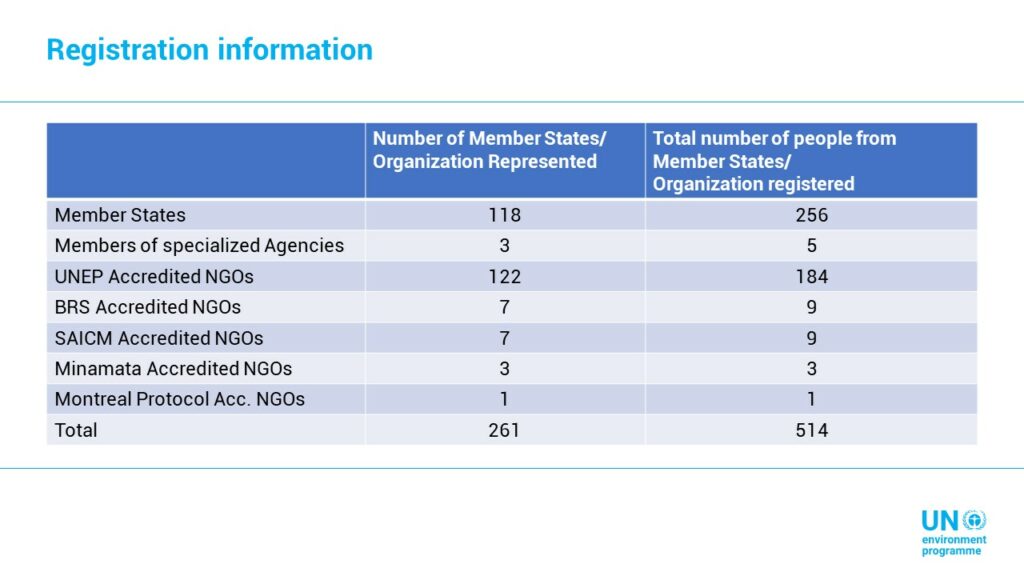
Registration information for OEWG 2.
Meeting badges
- An official SPP OEWG 2 badge is needed to access the premises of the session.
- For security reasons, all participants are requested to always wear their badges visibly.
- Loss of a badge should be reported immediately to the registration centre.
- There is no secondary access badges required to enter the plenary room.
- Badges can be collected from the UN compound main access point from 8 December 2023. Timing will be communicated via email.
- You will be required to bring your approval ticket (hardcopy or softcopy) as well as your passport or ID.
On-site disbursement of DSA
- Disbursement of the DSA will be made on-site, at the Glass Fishbowl near the Press Room, via physical prepaid cards in US dollars, according to the schedule below.
- Funded delegates that have a Swiss card and provided the number when applying for travel support, are kindly requested to bring their card with them.
- Sponsored participants will also be requested to present to the designated staff the original arrival boarding ticket and the physical travel identification document used to enter Kenya.
- Schedule for DSA disbursement will be shared closer to the date of the meeting.
Issuance of Visas
- Issuance of visas is determined solely by the national authorities of the venue.
- As recommended by the Kenyan authorities: Applications for entry visas for the Republic of Kenya can be made online via: https://evisa.go.ke/evisa.html
- Holders of service and diplomatic passports should apply for a courtesy visa via the eVisa portal.
- Holders of ordinary passports can apply for a single-entry visa via the eVisa portal. The cost of the visa is 51 US dollars.
- As supporting documents, participants are requested to upload the invitation letter and the letter confirming their registration.
- For more information, please contact the logistics note.
Guidance on Delivery of Statements
- Delegations are kindly requested to submit statements to be made on behalf of regional or political groups and national statements by email to spp-cwp@un.org.
- Major Groups and Stakeholder organizations are also invited to submit their statements to spp-cwp@un.org
- Statement should be submitted well in advance of the meeting, and no later than two hours before delivery, and only in soft copy (PDF format).
- It will greatly help the Secretariat and interpreters if the file name follows the format: “Agenda item X_ COUNTRY/ORGANIZATION NAME”.
- Statements will remain embargoed until their delivery, after which they will be available on the OEWG 2: Science-Policy Panel to contribute further to the sound management of chemicals and waste and to prevent pollution (unep.org)
Dining | The following cafes / restaurants are available to delegates:
- Safari Park Hotel – Main cafeteria located near the lobby of the UN Complex.
- Dinner at the Main Cafeteria will be served until 9:00 pm from 11 December until 15 December
- Delegates Lounge will be available until 9:00 pm during the same period.
- River Café in the Delegates Lounge – Located on the lower level of the UNON Conference Room area
- Amaica – Located near Block A
- The Good Food Company – Located between Block 1 and 2 of the New Office Facility
Request for bilaterals | A limited number of small meeting rooms may be offered for bilateral meetings and/or internal meetings. To request bilateral rooms:
- Please email nadya.omar@un.org
- Reservations will be accepted for 30-minute durations starting on the hour and half hour.
- Include “SPP-2 bilats” in the email subject line.
- The request should specify the date and time of the bilateral meeting and the name of the other delegation participating in the meeting to avoid double booking.
Prayer and lactation rooms | The Prayer and Lactation Rooms are located in the corridor adjacent to Conference Room 1. Please enter via the Conference room 1 door and you will see a sign on the left.
Plastic-Free Conference | Single use plastic bottles are not allowed within the premises of the UN compound. Each conference room will have a water dispenser. Please come with your water bottles.
UN Code of Conduct | SPP OEWG 2 will be held in strict compliance with the UN code of conduct to prevent harassment, including sexual harassment, at UN System events. See SPP OEWG 2 meeting website for more information.
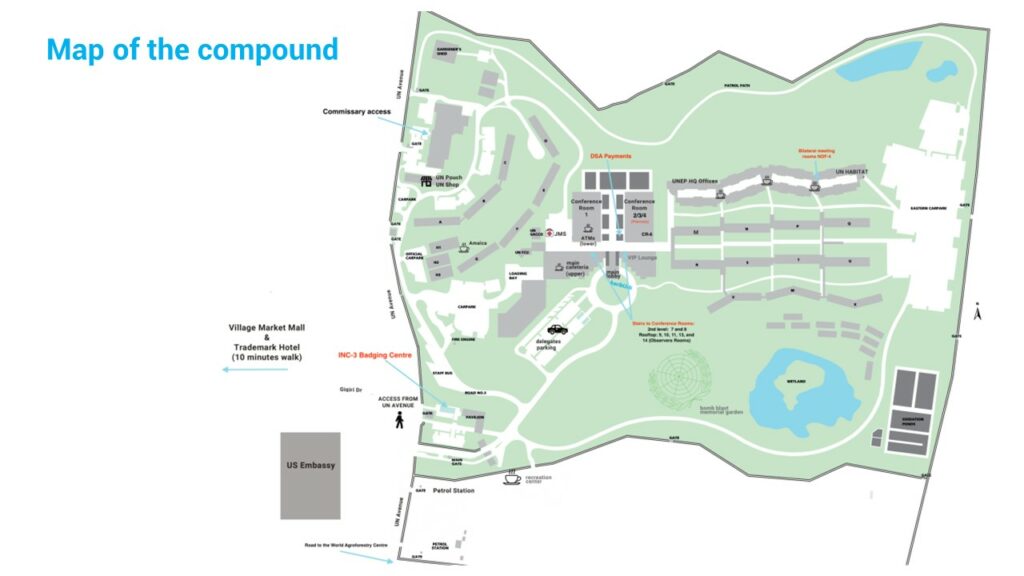
Map of the UN Nairobi grounds.
Q&A
Q: A human rights working group on transnational society is engaged on plastics, would there be a relationship with this group? Will there be regional meetings between open-ended working groups 2 and 3?
Q: Is there a call for written submissions only on open-ended working group two documentation or also on operating principles, needs, and capacity building?
Tessa GOVERSE | The Secretariat is anticipating and would stand ready if regional meetings or briefings would be required between the OEWG 2 and 3. That is certainly in the preparation of the Secretariat. We also would like to point out that the timeline between the second and the third session will be extremely short, which implies that documentation will need to be prepared very soon. The timing of the regional meetings between the first and the second session was rather spread out. As such, this must be considered if regional meetings and briefings are requested.
With regards to the question on engagement on specific topics and with specific experts or stakeholders, this is something that would come out once the outcome of the open-end working group is put on the table, when the proposals for the science policy panel are actually considered. This then would include the engagement with relevant key stakeholders and topics. At this stage the proposals of how the various issues or topics would be prioritized is on the table for discussions at OEWG 2. There is an anticipation of what the panel will be looking at.
With regards to the calls for written submissions, at the moment, there’s only one call for written submissions which is indeed the call for any written submissions in relation to the documentation for OEWG 2. At this point no further submissions would be sought on those calls.
Q: Could you kindly confirm that statements are expected to be delivered both in general views under point 4 for regional groups and later for each document presented in plenary?
There will be opportunity for presenting general views on item four but they will also be sought by document. The scenario note shows the organization of the session and further information on the opportunity to make statements under item four.
Video
Live on Webex.
Previous Road to OEWG 2/ SPP-CWP Series Events
Arranged in reverse chronological order.

Procedures for Addressing Conflicts of Interest: Lessons Learned from Existing Science-Policy Interfaces | Road to OEWG 2 Series
18 October 2023 | 14:00 – 15:30 CEST


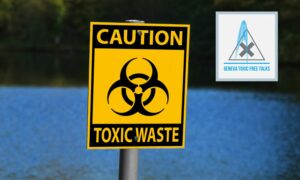



Road to OEWG 2 | Developing Operating Principles of the Science-Policy Panel on Chemicals, Waste and Pollution Prevention / SPP-CWP Series
26 April 2023 | 13:00 – 14:30 CEST
Documents
All Information Documents and Working Documents are available on the OEWG-2 Website under the « Pre-Session Documents » tab.
- Logistics note for participants
- Skeleton outline for proposals for the establishment of a science-policy panel (UNEP/SPP-CWP/OEWG.2/2)
- Background document on procedures for addressing potential conflicts of interest (UNEP/SPP-CWP/OEWG.1/INF/8)
- Draft scenario note for the second session of the ad hoc open ended working group on a science-policy panel to contribute further to the sound management of chemicals and waste and to prevent pollution
- Written submissions on needs and questions the panel may handle
Links
- Road to OEWG 2 | Science-Policy Panel to Contribute Further to the Sound Management of Chemicals and Waste and to Prevent Pollution / SPP-CWP Series
- Regional Meetings and Briefings
Photo Credits
Attribution for photo © S Martin / Flickr


